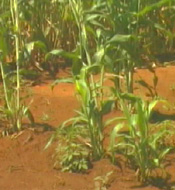-
(单词翻译:双击或拖选)
The International Atomic Energy Agency is making a push for an unusual type of technology, using radiation to produce higher yielding and hardier1 plants. Lisa Bryant has more on the technology that the IAEA says could help reduce hunger affecting millions of people in a world that faces a food crisis.
 The Vienna-based IAEA is best known for its programs to introduce civilian2 nuclear technology and to monitor whether countries are trying to acquire nuclear weapons. But it is also involved in plant breeding, using radiation to produce high-yielding plants that can adapt to harsh climate conditions. It calls the technology "mutation3 induction4."
The Vienna-based IAEA is best known for its programs to introduce civilian2 nuclear technology and to monitor whether countries are trying to acquire nuclear weapons. But it is also involved in plant breeding, using radiation to produce high-yielding plants that can adapt to harsh climate conditions. It calls the technology "mutation3 induction4."
Although the technology has been used for decades, the IAEA is now calling for more investment in this method of plant breeding at a time when some countries are struggling to feed their populations.
Chikelu Mba heads one of the IAEA's plant breeding units.
"Nuclear techniques can be deployed5 in the development of hardier crop varieties. Crops that can do well under minimum input6 agriculture. Crops that can survive under extreme weather conditions. Crops that will give reasonable yield under drought conditions, under flood conditions," explained Mba.
In Kenya, for example, farmers are growing wheat that has been modified using this radiation technique to be high yielding and drought resistant7.
The IAEA says the technique is not only safe, but cost effective.
"We need not be afraid of this technology. Indeed, when we talk about induced mutations, what we do is no different from the x-ray we take every time we go to the dentist. No radiation is left behind in our body," said Mba.
Mba says that about 100 countries are currently using the technology. But the IAEA is pushing for more investment to meet growing food needs around the world.
 The Vienna-based IAEA is best known for its programs to introduce civilian2 nuclear technology and to monitor whether countries are trying to acquire nuclear weapons. But it is also involved in plant breeding, using radiation to produce high-yielding plants that can adapt to harsh climate conditions. It calls the technology "mutation3 induction4."
The Vienna-based IAEA is best known for its programs to introduce civilian2 nuclear technology and to monitor whether countries are trying to acquire nuclear weapons. But it is also involved in plant breeding, using radiation to produce high-yielding plants that can adapt to harsh climate conditions. It calls the technology "mutation3 induction4." Although the technology has been used for decades, the IAEA is now calling for more investment in this method of plant breeding at a time when some countries are struggling to feed their populations.
Chikelu Mba heads one of the IAEA's plant breeding units.
"Nuclear techniques can be deployed5 in the development of hardier crop varieties. Crops that can do well under minimum input6 agriculture. Crops that can survive under extreme weather conditions. Crops that will give reasonable yield under drought conditions, under flood conditions," explained Mba.
In Kenya, for example, farmers are growing wheat that has been modified using this radiation technique to be high yielding and drought resistant7.
The IAEA says the technique is not only safe, but cost effective.
"We need not be afraid of this technology. Indeed, when we talk about induced mutations, what we do is no different from the x-ray we take every time we go to the dentist. No radiation is left behind in our body," said Mba.
Mba says that about 100 countries are currently using the technology. But the IAEA is pushing for more investment to meet growing food needs around the world.
点击 收听单词发音
收听单词发音
 收听单词发音
收听单词发音
1
hardier

|
|
| 能吃苦耐劳的,坚强的( hardy的比较级 ); (植物等)耐寒的 | |
参考例句: |
|
|
|
2
civilian

|
|
| adj.平民的,民用的,民众的 | |
参考例句: |
|
|
|
3
mutation

|
|
| n.变化,变异,转变 | |
参考例句: |
|
|
|
4
induction

|
|
| n.感应,感应现象 | |
参考例句: |
|
|
|
5
deployed

|
|
| (尤指军事行动)使展开( deploy的过去式和过去分词 ); 施展; 部署; 有效地利用 | |
参考例句: |
|
|
|
6
input

|
|
| n.输入(物);投入;vt.把(数据等)输入计算机 | |
参考例句: |
|
|
|
7
resistant

|
|
| adj.(to)抵抗的,有抵抗力的 | |
参考例句: |
|
|
|















